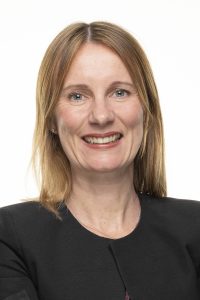This month, we had the pleasure to connect with Michelle Mitchell OBE who joined Cancer Research UK as CEO in November 2018.
As CEO, Michelle is responsible for the overall leadership and management of the world’s largest cancer charity dedicated to saving lives through research, supporting the work of over 4,000 scientists, doctors and nurses. Cancer Research UK is at the heart of progress that has seen survival rates double in the last forty years.
You’ve been the CEO of Cancer Research UK for exactly one year. How did the year go? What are some of the things you’ve been working on?
My first year as CEO has been an absolute privilege. It’s been such an inspiring, insightful and busy year, with several high-profile research programmes launching.
For example, we recently launched our largest ever investment in radiotherapy research, uniting seven centres of excellence across the UK into one network, called Cancer Research UK RadNet. We’ve also just launched a new transatlantic partnership to drive progress in early detection of cancer, called the International Alliance for Cancer Early Detection (ACED). And finally, we’ve been focused on accelerating progress for one of the hardest to treat cancers, through our new Brain Tumour Awards, which we’re running in collaboration with the Brain Tumour Charity. We had the first round this year and funded three multidisciplinary research teams.
We have a target of reaching 3 in 4 patients surviving cancer for 10 years or more by 2034 – which is very ambitious, and so my main focus has been ensuring we make progress against this mission with a focus on collaboration. The political and policy environment is key to this and so we’ve been working hard to influence Governments across the UK so that we have effective national cancer strategies. We’ve made progress this year, securing a strong commitment to improving early cancer diagnosis in the NHS Long-Term Plan – but there’s still more to do.
We have a target of reaching 3 in 4 patients surviving cancer for 10 years or more by 2034.
It’s been an exciting time for our commercial work, which plays a vital role in getting new treatments to the people who need them. In July we announced an exciting new partnership with SV Health Investors, which will allow us to do much more of this, to accelerate our research and ultimately save more lives.
I’ve been incredibly lucky at Cancer Research UK and have felt the full force of the charity behind me since day one, and that support has made it possible to deliver our ambitious agenda for 2019, in the face of a challenging external environment. I’ve been building relationships with so many inspiring people who contribute to our cause; scientists, researchers, clinicians, decision-makers, opinion-formers, people with cancer, supporters, volunteers and of course our staff and the brilliant people we fund in our centres and institutes.
What is it like being the CEO of a charity? What are some of the key challenges that come with it?
It’s a privilege and honour. The UK charity sector makes a huge difference to people’s lives daily and transforms the world we live in for the better. I’m motivated by impact – I want to work with the best minds to tackle the biggest social challenges. So for me, the charity sector is the perfect place to be, and to lead.
It’s a big responsibility: we need to lean into the challenges and changes we see before us. At Cancer Research UK, we’re entirely funded by the generosity of our supporters and ensuring we continue to inspire millions of people to support us through their voice, time and generous gifts is high on my agenda.
We have some big challenges, but also big opportunities. Cancer incidence and prevalence is rising, largely because of our ageing population. But our understanding of how to cure, control, eliminate and treat cancer will be radically improved over the next 10 years. Data and technology will change everything – and we’re already seeing that happening. Our income generation and fundraising is likely to become harder over the coming years, and so maintaining our relevance to people affected by cancer will be critical.
However, I am confident that we will succeed. We are making clear and measurable progress against our mission and goals, and we will continue to do that. One of my top priorities as CEO has been building collaboration. I see our role as convening and partnering with the world’s best minds, institutes, companies, charities and people – not just in the UK, but across the world – to build a movement of people who are all committed to beating cancer together.
We have the belief, the strategy and the plan to transform our thinking about how we can radically improve cancer outcomes, through funding the highest quality science and engaging all those close to cancer, then inspiring them to take action and give. And through all of our work, we must be open, accountable and transparent about what is going well and what isn’t going so well, to build confidence in our ability to make progress against our mission.
What hurdles does Cancer Research UK face as a business?
I have inherited an incredibly well-run and impactful charity, for which I must thank my brilliant predecessor. We are lucky to be in a relatively strong financial position, given the wider challenges and uncertainties that we face in the economy. Thanks to our supporters’ generosity the last financial year was one of our most successful income generation years so far, which has enabled us to spend more on our charitable work than almost any time in our history.
But we can’t afford to be complacent – this is a time of significant economic uncertainty, so we’re having to think carefully about how we plan our activity for the coming years. We’re also in turbulent times politically, so it’s more challenging than usual to keep cancer at the top of the political agenda. And while technology is having a hugely positive impact on our research, it’s also changing the model of how people engage with causes they care about, and how they consume media. That is another challenge and so we’re actively thinking about how we use technology, in all areas of our work.
What’s the impact that the uncertainty which surrounds Brexit is having on Cancer Research UK so far?
This is something we’ve been working hard to understand. We’re confident that we are prepared for possible short-term disruption, but we’ll keep a close eye on this as time goes on. We’re very conscious about the impact of the uncertainty on our research community, as about half of our PhD students and 76% of our postdoctoral researchers are not from the UK. We would be nothing without our researchers, so we’ve been influencing the UK Government to make sure we are able to attract, recruit and retain global talent.
More than a quarter of the clinical trials that we fund involve at least one other EU country, and international trials are particularly important for research in rare cancers and children’s cancers. It’s absolutely vital this collaboration continues and so the UK must align with the EU Clinical Trial Regulation. We’re also pushing for the UK to maintain regulatory alignment with the EU on medicines licensing, by seeking as close as possible a relationship to the European Medicines Agency, to avoid being deprioritised by pharmaceutical companies bringing new drugs to market.
More than a quarter of the clinical trials that we fund involve at least one other EU country, and international trials are particularly important for research in rare cancers and children’s cancers.
It’s impossible to tell what will happen in the future, but we’re keeping a close eye on the situation, and putting plans in place to make sure we’re in the best position possible as an employer, as an organisation, and as an advocate for the needs of people affected by cancer to Government.
What’s on Cancer Research UK’s agenda for 2020?
We remain completely focused on our organisational ambition, which is to reach 3 in 4 patients surviving cancer for 10 years or more by 2034. We have an exciting research agenda which will help us save lives, following four key objectives: preventing cancers, diagnosing cancer earlier, developing new treatments and making cancer treatments more effective for each patient.
We have a world-class research network around the UK which allows us to do this. One of our flagship sites is the Francis Crick Institute, an incredible multidisciplinary institute. The Crick has recently become part of our Cancer Research UK City of London Centre, a new world-leading research hub for biotherapeutics.
But research alone won’t get us to where we want to be: to get to 3 in 4 surviving cancer, we need the NHS to be making progress more quickly and we need to keep cancer at the top of the political agenda. So influencing cancer plans across the UK will be an important focus. We want to do this in collaboration as much as we can, as the political noise means it’s more important than ever to collaborate with others who share our goals, to amplify each other’s voices. For example, for the upcoming general election, we collaborated with 28 other cancer charities to publish one joint manifesto, to speak as one voice for people affected by cancer. I’m so proud of this – we can’t beat cancer alone, it has to be a team effort.
We can’t beat cancer alone, it has to be a team effort.
Finally, we will be thinking more and more about how we can work in an innovative way to make the biggest impact – for example licensing IP to healthcare companies or helping create spin-out companies. To date, 33 companies have been spun out of research we’ve funded, raising over half a billion in capital to progress new products that can help us beat cancer.
What areas do you plan to invest in in 2020?
We have several flagship research projects which will be getting started in 2020, including our new radiotherapy research network, Cancer Research UK RadNet, and our International Alliance for Cancer Early Detection (ACED). These are hugely exciting investments but represent only a relatively small proportion of our overall research spend and the breadth of our work: last year, we committed £546 million to research on almost every aspect of cancer.
Information and influencing is another important aspect of our work. Last year we spent £42 million on increasing awareness of cancer and on working with the Government and the NHS to make sure advances in research and understanding reach people affected by cancer sooner. This work will be a continued focus for 2020 – keeping cancer high on the political agenda has never been more important.
We’re also increasingly focused on data and technology. We want to drive digital transformation across our whole business – not only in research but also our engagement and efficiency, as well as enabling innovation in our income generation and fundraising.
Strategy will be a key focus for us over the next year too. While we are in a strong position financially, we are still thinking hard about how we can work as efficiently as possible, and to make sure we’re ready for the future. None of our progress would be possible without our people, so we’ll be continuing to engage our staff and volunteers in shaping our work and developing our new strategy so that we can be sure we’re in the best position to make the biggest difference possible for people affected by cancer.
About Michelle Mitchell:

Michelle Mitchell OBE, CEO of Cancer Research UK
Michelle Mitchell OBE is a nationally recognised and influential leader in the voluntary and health and care sector who is passionate about helping organisations achieve their strategic goals through innovation and collaboration.
Before joining Cancer Research UK, Michelle was CEO of the MS Society for 5 years. Michelle oversaw a major realignment of the MS Society’s strategy, and under her leadership, there was a 40% increase in access to effective MS treatments and the launch of a £100m research fundraising appeal. Prior to this, Michelle was Director General at Age UK where she was part of the leadership team that drove the successful merger of its two predecessors to form the largest charity in the UK for older people.
Michelle is a non-executive director of NHS England and champions person-centred care and the relationship with the voluntary and community sector. She has been a trustee of The King’s Fund, the Power to Change Trust and the Young Women’s Trust and has been Chair of the Fawcett Society. In recognition to her significant contribution to the charity sector, Michelle was awarded an OBE in 2016.
Since taking the helm at Cancer Research UK, Michelle’s focus has been on collaboration. And with her committed approach, she is now leading the charity in the next phase of achieving its mission that by 2034, 3 in 4 people will survive their cancer for at least 10 years.













